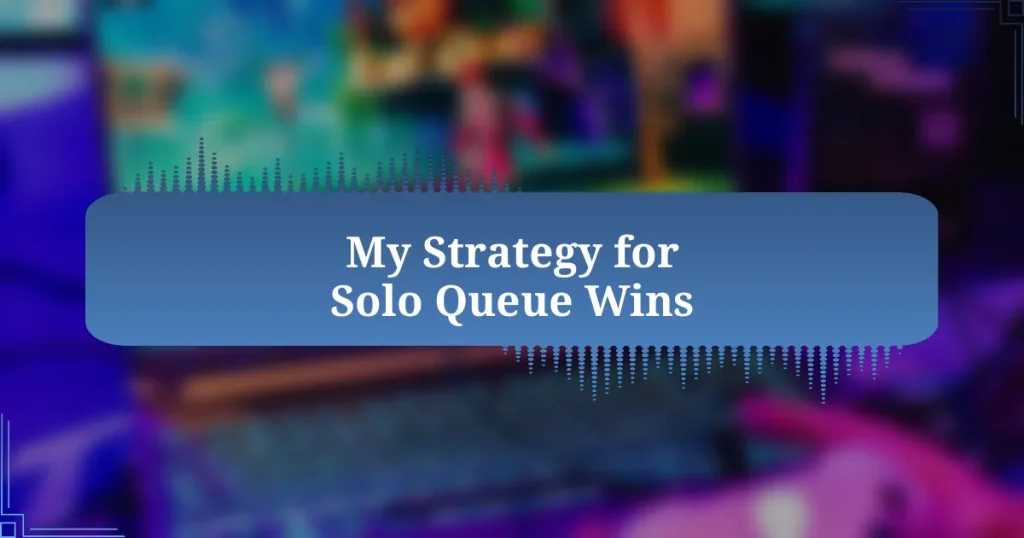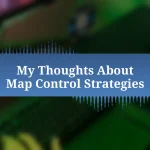Key takeaways:
- In solo queue, adapting strategies and maintaining effective communication with teammates are crucial for improving overall performance.
- Mental preparation, including focusing on strengths and setting mini-objectives, can significantly enhance gameplay and resilience during challenging matches.
- Analyzing personal gameplay, including assessing decisions and performance metrics, allows for targeted improvements and growth as a player.
- Utilizing voice chat effectively fosters teamwork and can transform gameplay dynamics, making collaboration more successful.
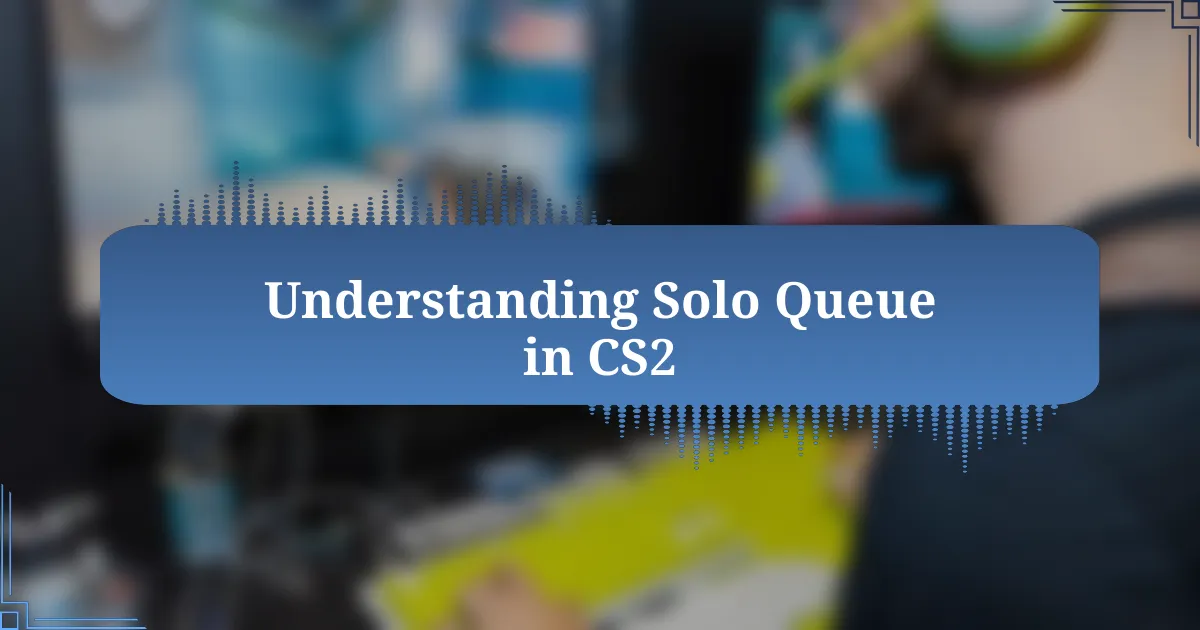
Understanding Solo Queue in CS2
Solo queue in CS2 can be a unique and sometimes daunting experience. I remember my early matches, feeling like I was walking a tightrope – one wrong move, and the whole team might collapse. It’s a pressure cooker, presenting the challenge of relying on your own skills while navigating the unpredictability of teammates.
One aspect that often surprises players is the diversity of skill levels you encounter. Think of it like a box of chocolates: you never quite know what you’re going to get. I’ve been thrilled to team up with highly skilled players, only to be let down by others who struggle to grasp basic strategies. This imbalance can be frustrating, but it also pushes you to adapt and improve. How do you handle these moments? Personally, I focus on communication and encouragement, hoping to elevate the team’s overall performance.
Moreover, understanding the mindset of solo queue is crucial. There’s often a sense of isolation—you’re on your own, both in terms of strategy and responsibility. I’ve felt that loneliness when my team didn’t seem to rally around a plan. It’s vital to foster a positive attitude and lead by example. When you embrace this mindset, the experience shifts from feeling like a solo climb to a shared journey, even when you’re technically alone.
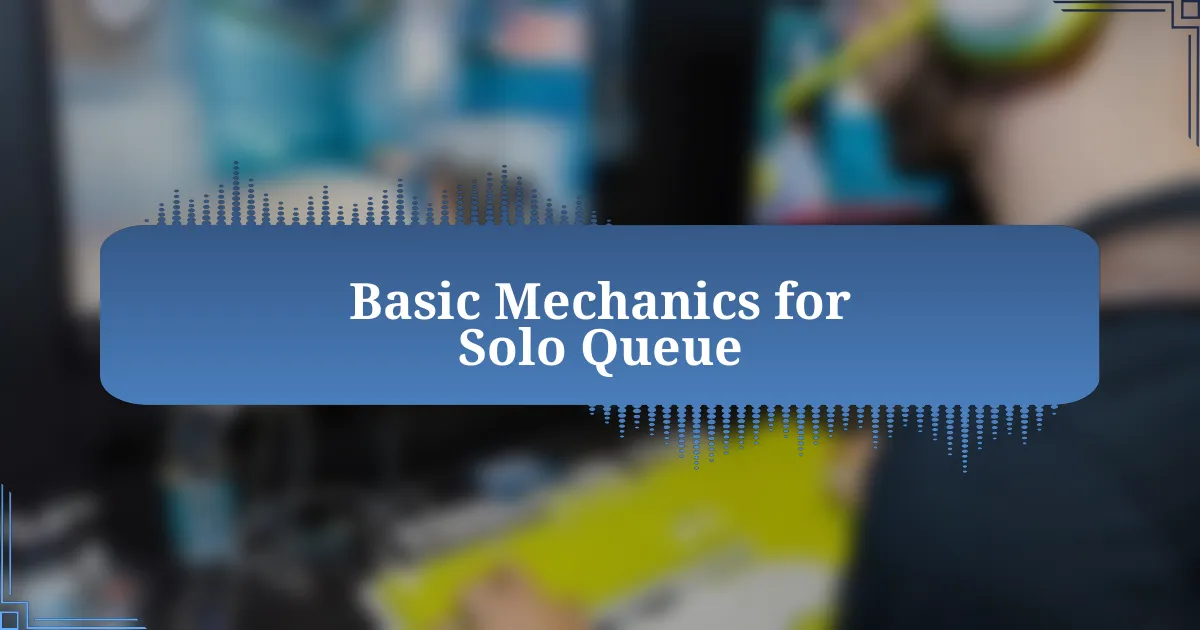
Basic Mechanics for Solo Queue
When diving into solo queue, mastering key mechanics is essential. My first few matches were a whirlwind of chaos, but I quickly learned that positioning and map awareness can make or break a game. I often remind myself to check angles before crossing; those split-second decisions can prevent unnecessary deaths and tilt your teammates.
Another critical aspect is understanding the economy. In my earlier games, I would often buy expensive weapons even when my team couldn’t afford full armor. It was disheartening to realize that my spending decisions directly impacted the team’s chances of victory. Now, I prioritize communicating and coordinating the buy phase, because a well-balanced team is much more formidable than a squad of lone wolves.
Lastly, utilizing voice chat effectively can be a game-changer. I still vividly recall a match where I took the initiative to call out enemy positions and strategize with my team. The synergy we built in just a few minutes transformed our gameplay. Have you ever found that a simple call-out can shift the tide of a match? I know I have—every small contribution can ripple through the team, fostering a sense of unity.
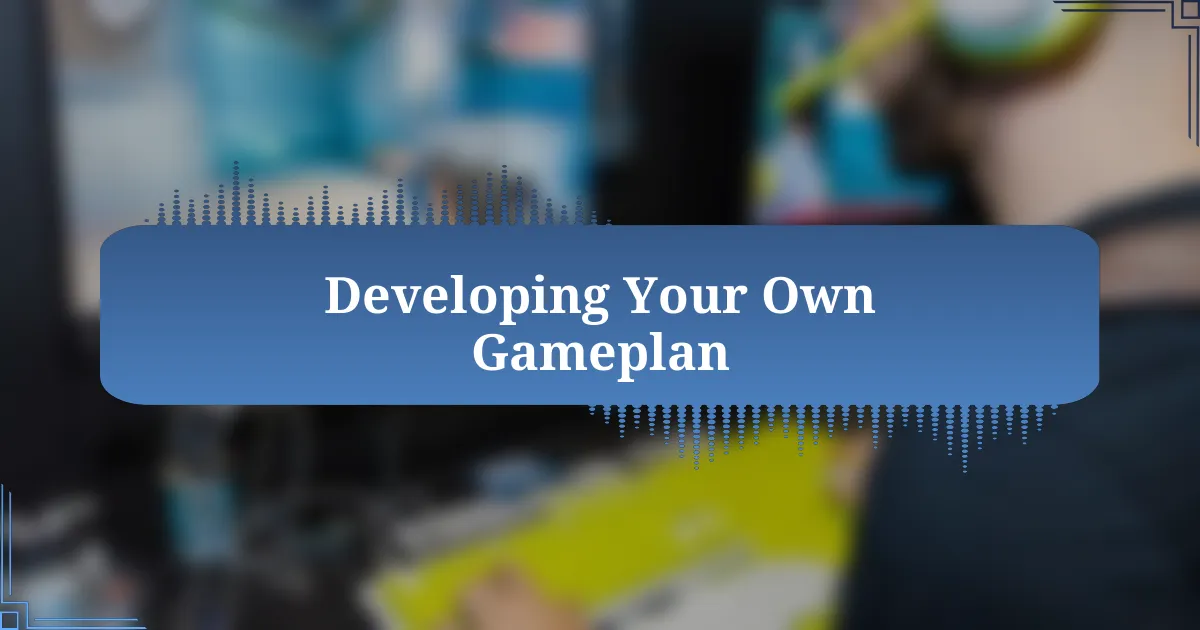
Developing Your Own Gameplan
To develop your own gameplan, it’s vital to reflect on your playstyle and adapt strategies that align with your strengths. I remember when I first tried to imitate pro players, but it didn’t feel right. Instead, I took a step back and focused on what worked for me—utilizing my aim and positioning to create advantageous duels. Have you ever felt more comfortable playing a support role rather than an entry fragger? Finding that niche can be transformative.
Another essential aspect of crafting a gameplan is establishing clear communication with your teammates. In one match, I noticed that simply suggesting a rotation brought clarity and boosted morale. It’s amazing how a few well-timed words can set the pace of a match. I always encourage sounding out strategies before executing them; it creates a shared vision that everyone can rally behind.
Lastly, I’ve learned the importance of adaptability. One game sticks out where my team faced a particularly aggressive opponent. We struggled initially, but revising our approach mid-match allowed us to regain control. Have you found that sometimes the best plans are the ones we adjust on the fly? Being open to change not only helps you win, but also enhances your individual growth as a player.
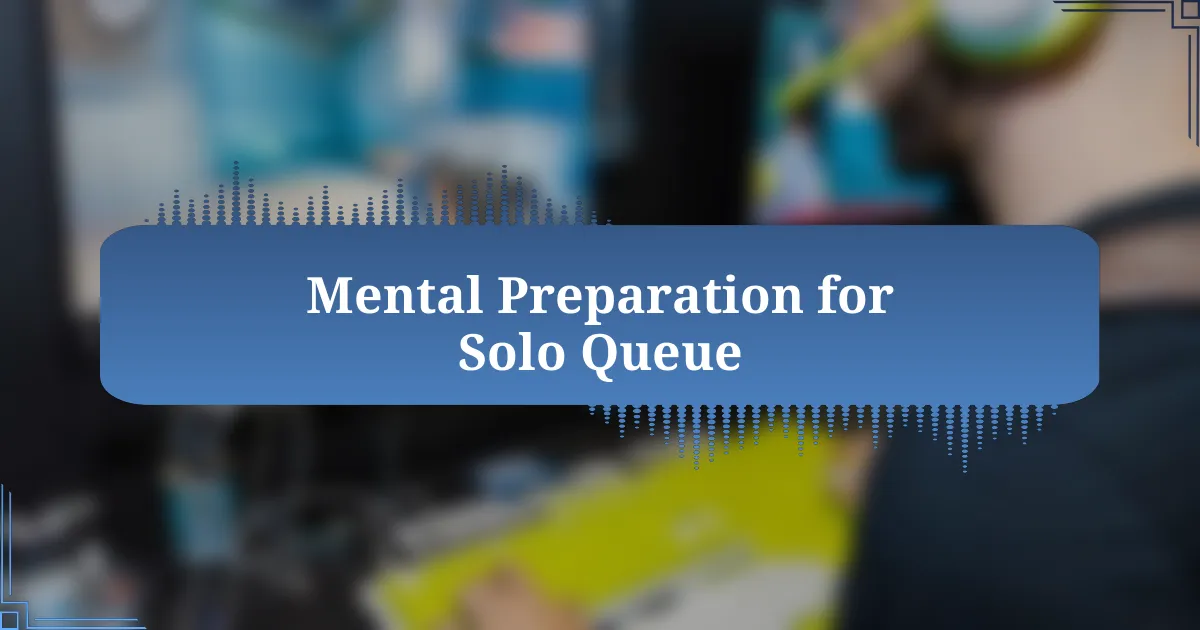
Mental Preparation for Solo Queue
Mental preparation is a crucial aspect of solo queue. Before each match, I like to clear my mind, focusing on the game ahead instead of past failures. Have you ever noticed how dwelling on previous losses can affect your gameplay? I’ve found that taking a few deep breaths and reminding myself of my strengths can help reset my mentality and foster a more positive approach.
I’ve realized that building confidence is as important as honing skills. Before I enter a solo queue, I often recall a victorious game where I played exceptionally well. This reflective practice not only boosts my morale but serves as a reminder that I can perform under pressure. Doesn’t it feel good to have that mental backup when things get tough? Keeping those memories at the forefront can make a significant difference in how I handle challenges during a match.
Finally, I emphasize the importance of maintaining a flexible mindset. When things start to go wrong in a game, I’ve learned to focus on what I can control rather than getting frustrated. One match I recall had us trailing behind, and instead of giving in to negativity, I shifted my focus to small goals—like getting a single kill or spotting enemy positions. Have you tried setting these mini-objectives during tough games? They can turn the tide of your mindset and ultimately enhance your overall performance.
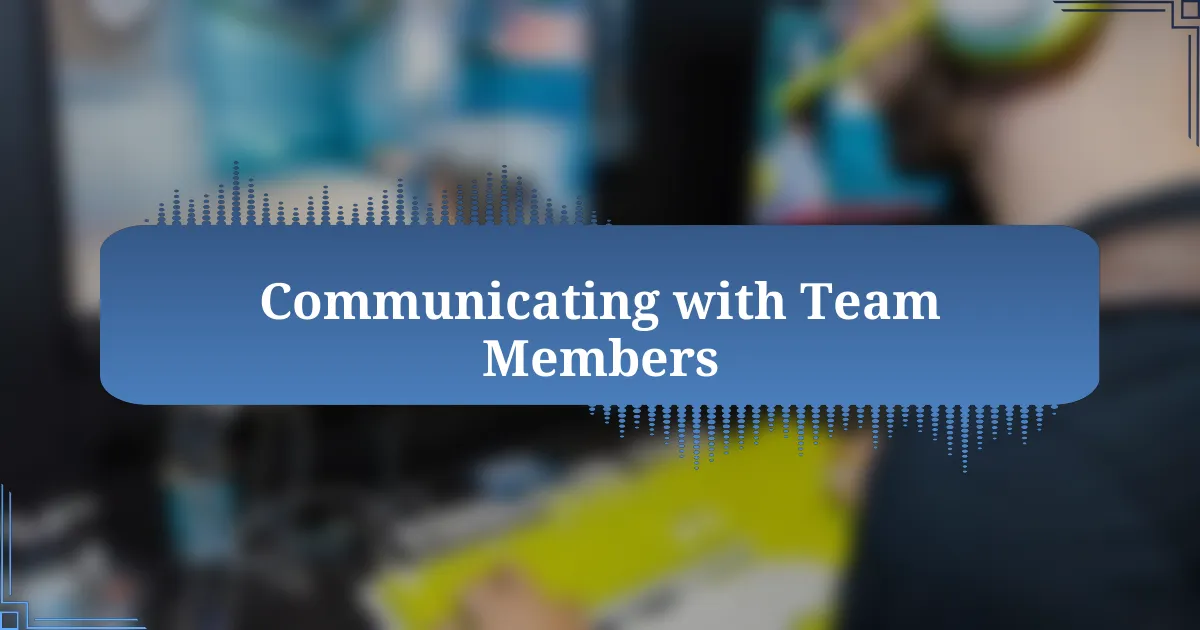
Communicating with Team Members
Clear communication is fundamental in Counter Strike 2, especially in solo queue where players are often strangers. I vividly recall a match where my teammates were silent, and despite a strong start, we quickly fell apart. It reminded me that even a simple callout or question, such as alerting someone to an enemy’s position, can change the course of the game. Aren’t teammates more valuable when they share information?
I’ve learned that adapting my communication style to the team’s vibe can set the tone for collaboration. One time, I noticed some players were more responsive to light humor, which lifted the team’s spirits and made everyone feel more connected. Have you ever tried cracking a joke during a tense moment? Surprisingly, it not only eased the pressure but also led to better coordination.
Utilizing voice chat effectively can transform a disjointed team into a well-oiled machine. I remember a match where I took the initiative to communicate strategies clearly. I explained our intended plays step by step, and the clarity helped my teammates follow along seamlessly. The excitement of executing a plan successfully with others amplifies the joy of the game. Who doesn’t appreciate the thrill of teamwork?

Analyzing Your Own Performance
Reflecting on my own gameplay through demos has been a real eye-opener. I remember reviewing a particularly frustrating match where my aim felt off. As I watched, I noticed how rushing my shots led to missed opportunities. Have you ever replayed a match and thought, “What was I thinking?” Analyzing those moments can provide clear lessons that practice alone might not highlight.
In addition to mechanical mistakes, I’ve found evaluating my decision-making crucial. There was a time when I chose aggressive flanking plays that often backfired, leaving my teammates outnumbered. After recognizing this pattern, I started focusing on timing and positioning, which dramatically improved my team’s chances. It’s funny how changing one aspect of gameplay can lead to a considerable impact. How often do we overlook the choices that define our matches?
Tracking my performance metrics has also been a game-changer. By keeping tabs on my kill/death ratio and objective contributions, I can pinpoint areas for improvement. I distinctly recall a period where my K/D was struggling, and once I started analyzing those stats, I realized that my map awareness was lacking. Have you taken the time to look at your own statistics? Understanding the numbers can illuminate blind spots in our gameplay that we might overlook in the heat of battle.











